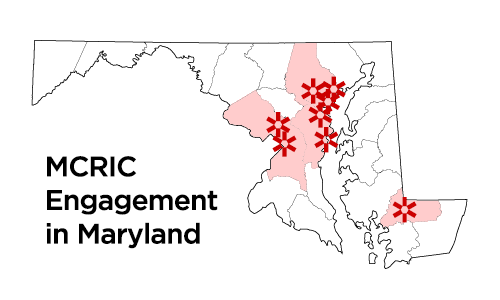MCRIC Partners with Baltimore Police Department to Reduce Crime through Data-Driven, Research-Based Techniques and Innovations
The Baltimore Police Department (BPD), the Governor’s Office of Crime Prevention, Youth, and Victim Services, and the Maryland Crime Research and Innovation Center (MCRIC) at the University of Maryland are partnering on a new initiative to apply data-driven, research-informed strategies to crime reduction efforts in Baltimore.
MCRIC is collaborating with Baltimore Police Department on their new “Baltimore Community Intelligence Centers,” which are modeled after the Chicago Police Department’s “Strategic Decision Support Centers.” These centers bring together tools, technology, processes and personnel to develop data-driven, proactive policing strategies; help police to focus on high-risk offenders, places, and activities; allow them to practice focused deterrence, place-based response, as well as hot spot policing; and have led to a sustained drop in violent crime in the areas where they have been implemented.
“The Baltimore Police Department thanks the University of Maryland for this collaborative partnership as we work to implement evidence-based policing and management approaches toward a sustainable reduction in violent crime,” said Commissioner Harrison. “The addition of this research partnership will help provide a holistic approach on how we can maximize the efficiency and effectiveness of our resources.”
The centers implement new technology, including mobile devices, predictive policing, gunshot detection, and additional cameras, as well as new processes, including a commander’s daily briefing, and embedded crime data analysts who work collaboratively with police. A Crime Data Analyst from MCRIC will be embedded in BPD’s new Baltimore Community Intelligence Center in the Southwestern District. A 2019 Rand Corporation research study found that Strategic Decision Support Centers are a promising tool for supporting crime reduction.
“We are pleased to have helped foster this relationship between the Baltimore Police Department and University of Maryland,” said Glenn Fueston, Executive Director of the Governor’s Office of Crime Prevention, Youth, and Victim Services. “Leveraging data on violent crime can be an effective tool to make communities in Baltimore City safer. We are hopeful this partnership will yield real results and bring us closer to long-term solutions.”
Sarah Appleby, the new MCRIC Crime Data Analyst working with BPD’s Southwestern District, is an advanced Ph.D. student at the University of Maryland. Appleby will apply her data analysis and research skills to her new role with BPD, working collaboratively with officers to identify individuals and places at high risk for violence or victimization, developing strategy, and engaging in real-time crime analysis.
“The Maryland Criminal Research and Innovation Center is excited to collaborate with the Baltimore Police Department on this important initiative, and contribute our research expertise and data analysis skills toward crime reduction efforts in Baltimore,” said MCRIC Director and Chair of Criminology and Criminal Justice Dr. Gary LaFree. “We look forward to building a long-term partnership with our colleagues at Baltimore Police Department, the University of Maryland Baltimore and the University of Maryland College Park, and the Governor’s Office of Crime Prevention, Youth, and Victim Services to make a positive impact and help keep Baltimore residents safe.”
MCRIC is an interdisciplinary initiative working with law enforcement, lawmakers, academic peers, and industry leaders, to promote data sharing, exchange of knowledge and best practices, and development of new approaches. MCRIC launched in 2018 with support from the Governor’s Office of Crime Prevention, Youth, and Victim Services and draws research expertise from across multiple academic disciplines at the University of Maryland, including the top-ranked Department of Criminology and Criminal Justice.





 Dr. LaFree received his Ph.D. in Sociology from Indiana University in 1979. During 2005-2006, he served as President of the American Society of Criminology (ASC). Dr. LaFree was named a Fellow of the American Society of Criminology in 2006 and a member of the National Academy of Science's Committee on Law and Justice in 2008. He has also served as the Past President of the ASC’s Division on International Criminology (1991-1993), the chair of the American Sociological Association’s Section on Crime, Law and Deviance (1991-1993), the Executive Board of the Harry Frank Guggenheim Foundation (2001-2006), and the Executive Committee of the Justice Research Statistics Association (2000-2001, 1993-1994).
Dr. LaFree received his Ph.D. in Sociology from Indiana University in 1979. During 2005-2006, he served as President of the American Society of Criminology (ASC). Dr. LaFree was named a Fellow of the American Society of Criminology in 2006 and a member of the National Academy of Science's Committee on Law and Justice in 2008. He has also served as the Past President of the ASC’s Division on International Criminology (1991-1993), the chair of the American Sociological Association’s Section on Crime, Law and Deviance (1991-1993), the Executive Board of the Harry Frank Guggenheim Foundation (2001-2006), and the Executive Committee of the Justice Research Statistics Association (2000-2001, 1993-1994). Maryland Crime Research and Innovation Center
Maryland Crime Research and Innovation Center